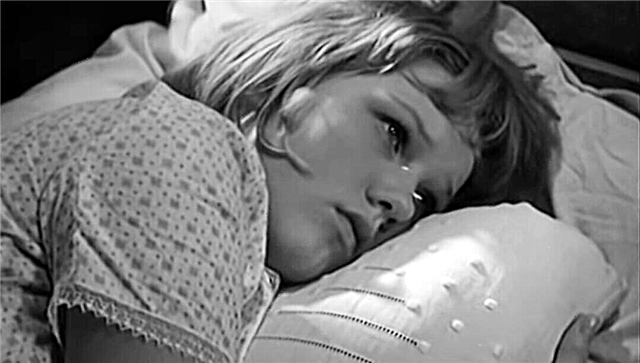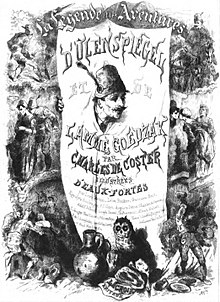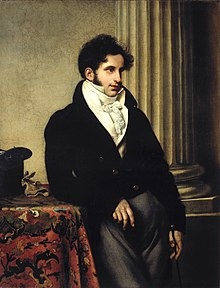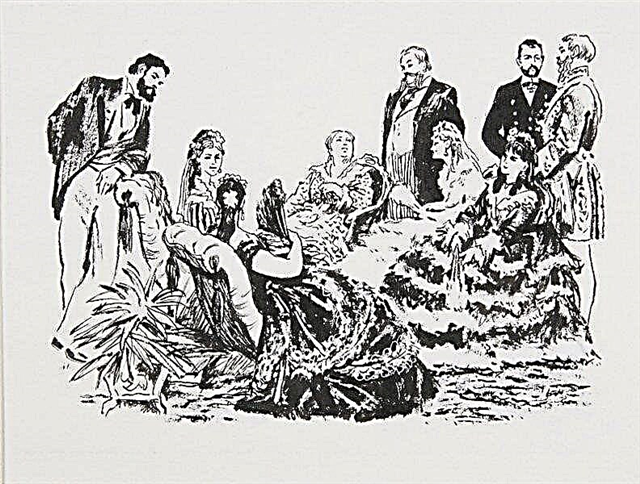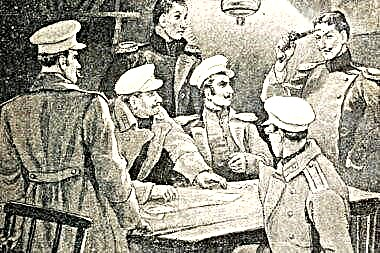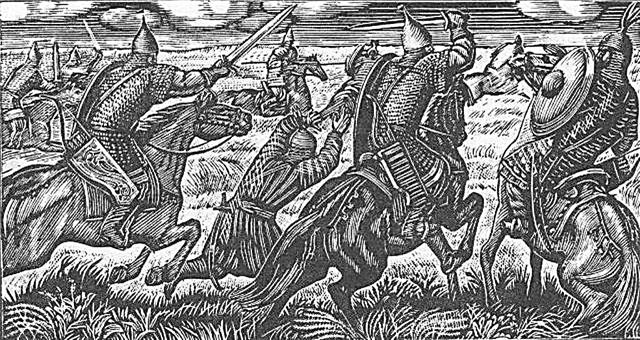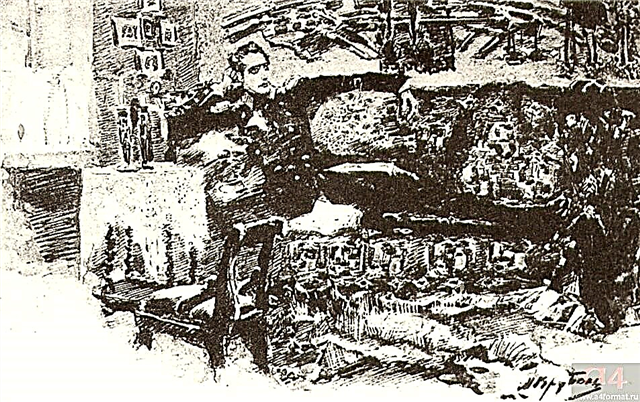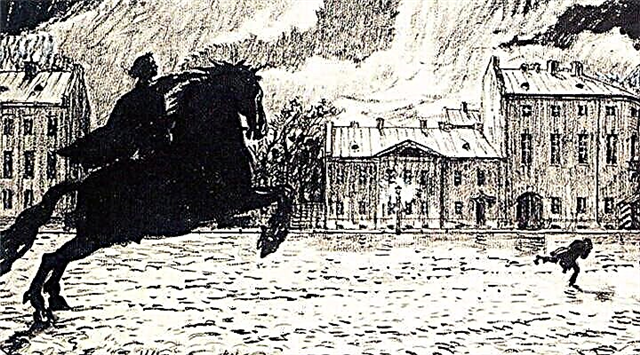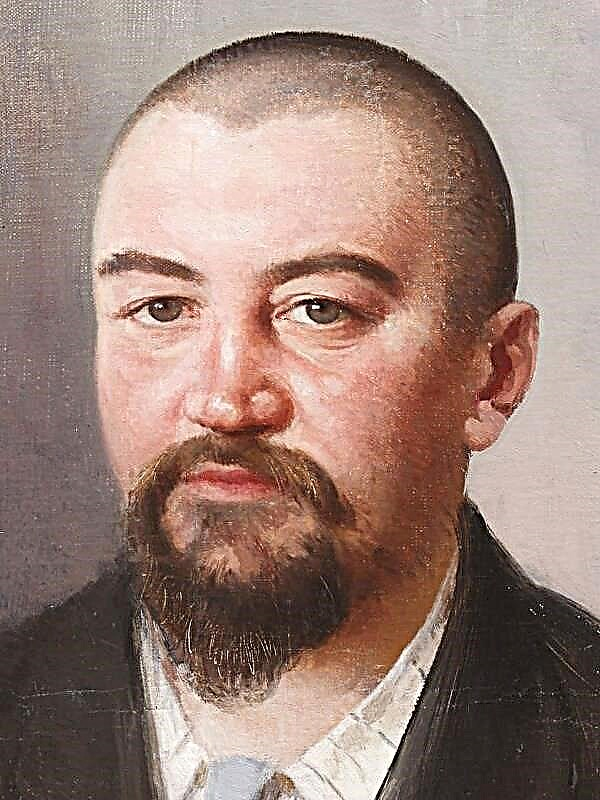The action takes place in the modern author of a German play. The plot unfolds over two years. The drama was preceded by an epigraph of Hippocrates, which in the Russian translation reads as follows: “What medicine does not heal, iron heals; what iron does not heal, fire heals. "
In the family castle of the Barons von Moor there is a father, the youngest son, Franz and a pupil of the count, the bride of the eldest son, Amalia von Edelreich. The plot is a letter received by Franz from a solicitor from Leipzig, which tells of the dissolute life of a student of the University of Leipzig, Karl von Moor, the eldest son of the count. Saddened by bad news, the old man von Moor allows Franz to write a letter to Karl and inform him that the count, enraged by the behavior of his eldest son, robs him of his inheritance and his parental blessing.
At this time, in a tavern on the border of Saxony, where students of the University of Leipzig usually gather, Karl von Moor awaits an answer to his letter to his father, in which he sincerely repents of his dissolute life and promises to continue to do business. Together with Karl, time kills his friend and fellow student Spiegelberg. He argues that it is better to rob than live in poverty. A letter comes from old man von Moor. After reading it, Karl becomes desperate. Meanwhile, Spigelberg is discussing how wonderful it is to live in Bohemian forests, to take money from wealthy travelers and put it into circulation. For poor students, this idea seems tempting, but they need an ataman, and although Spiegelberg himself is counting on this position, everyone unanimously chooses Karl von Moor. Hoping that “blood and death” will make him forget his former life, father, bride, Karl takes an oath of allegiance to his robbers, and those in turn swear allegiance to him.
Now that Franz von Moor has managed to expel his older brother from his father’s loving heart, he is trying to denigrate him in the eyes of his bride, Amalia. He informs her that the diamond ring that she presented to Karl before separation as a guarantee of fidelity, he gave to the libertine when he already had nothing to pay for his love joys. He paints in front of Amalia a portrait of a painful beggar in rags, from whose mouth he is smitten with "deadly stupidity" - such is her beloved Karl now. But it’s not so easy to convince a loving heart. Amalia refuses to believe Franz and drives him away.
But a new plan has already matured in Franz von Moor’s head, which will finally help him realize his dream, to become the owner of the legacy of the Counts von Moor. To this end, he persuades the late son of a local nobleman, Herman, to change clothes and, having come to old Moor, tell him that he witnessed the death of Karl, who took part in the battle of Prague. The heart of a sick count is unlikely to withstand this terrible news. For this, Franz promises Herman to return to him Amalia von Edelreich, which Karl von Moor had once recaptured from him.
And so it goes. Old Man Moore recalls with Amalia his eldest son. At this time is a disguised Herman. He talks about Karl, left without any means of livelihood, and therefore decided to take part in the Prussian-Austrian campaign. The war threw him into Bohemia, where he died heroically. Dying, he asked to pass his sword to his father, and return the portrait of Amalia to her, along with her oath of allegiance. Count von Moor blames himself for the death of his son. Seeing the joy on Franz’s face, the old man begins to understand who is really to blame for all of Carl’s troubles. He leans back into the pillows and faints. Franz thinks the old man is dead, and enjoys the long-awaited death of his father.
Meanwhile, Karl von Moor is robbing in the Bohemian forests. He is brave and often plays with death, as he has lost interest in life. The ataman gives his share of the booty to orphans. He punishes the rich, who rob ordinary people, following the principle: "My craft is compensation, revenge is my business."
And in the family castle, von Moorov is ruled by Franz. He achieved his goal, but does not feel satisfaction: Amalia still refuses to become his wife. Herman, who realized that Franz tricked him, reveals the maid of honor von Edelreich “a terrible secret” - Karl von Moor is alive and old man von Moor too.
Karl with his gang is surrounded by Bohemian dragoons, but they manage to escape from it at the cost of the death of only one soldier, while the Bohemian soldiers lost about 300 people. The Czech nobleman, having lost all his fortune, as well as his beloved, whose name is Amalia, asks for von Moor’s squad. The story of a young man stirred up previous memories in Karl’s soul, and he decides to lead his gang to Franconia with the words: “I must see her!”
Under the name of Count von Brand of Mecklenburg, Karl penetrates his ancestral castle. He meets his Amalia and is convinced that she is faithful to the "dead Karl." In the gallery among the portraits of his ancestors, he stops at the portrait of his father and sneaks a tear away. No one recognizes the eldest son of the count, only the all-seeing and always suspecting Franz guesses his elder brother as a guest, but does not tell anyone about his guesses. The younger von Moor forces the old butler Daniel to swear that he will kill the visiting count. By the scar on his hand, the butler recognizes Karl in the Count von Brande, who is unable to lie to the old servant who raised him, but now he must leave the castle forever. Before disappearing, he decides to see Amalia. She feels for the Count feelings that she had previously been associated with only one person - Karl von Moor. Unrecognized, the guest says goodbye to her beloved.
Karl returns to his robbers, in the morning they will leave these places, and while he wanders through the forest. In the dark, he stumbles upon a tower and hears someone's voice. It was Hermann who came stealthily to feed the prisoner locked up here. Karl rips the locks off the tower and frees the old man, withered like a skeleton. The prisoner is the old man von Moor, who, unfortunately, did not die then from the message brought by Herman. When he came to his senses in a coffin, Franz secretly from people imprisoned him in this tower, condemning him to cold, hunger and loneliness. Karl, having listened to the story of his father, is no longer able to endure. Despite the family ties that bind him to Franz, he orders his robbers to break into the castle, grab his brother and deliver him alive.
Night. Old valet Daniel says goodbye to the castle, where he spent his whole life. Franz von Moor runs in in a bathrobe with a candle in his hand. He can not calm down, he had a dream about the Last Judgment, at which he was sent to hell for sins. He begs Daniel to send for the pastor. Throughout his life, Franz was an atheist, and even now he cannot reconcile with the pastor who has come and is trying to lead a debate on religious topics. This time, he is not able to laugh with ordinary ease at the thesis of the immortality of the soul. Having received confirmation from the pastor that fratricide and patricide are the most serious sins of man, Franz is frightened and realizes that hell cannot be avoided for his soul.
The robbers sent by Karl attack the castle, they set fire to the castle, but they fail to capture Franz. In fear, he himself is squeezed by the lace from his hat.
The members of the gang who have fulfilled the order return to the forest near the castle, where Karl, who was not recognized by his father, is waiting for them. Amalia comes with them, who rushes to the robber Moor, hugs him and calls him her fiancé. Then the old Moor with horror recognizes in the leader of these bandits, thieves and murderers of his beloved eldest son Karl and dies. But Amalia is ready to forgive her lover and begin a new life with him. But their love is hindered by the oath of allegiance given by Moor to his robbers. Realizing that happiness is impossible, Amalia prays for only one thing - death. Karl stabs her up.
The robber Moor drank his cup to the end, he realized that the world could not be corrected with atrocities, and his life was over. He decides to surrender to justice. Even on the way to Moorov Castle, he talked with a poor man who has a large family, now Karl goes to him so that he, having surrendered the "famous robber" to the authorities, will receive a thousand louis for his head.

